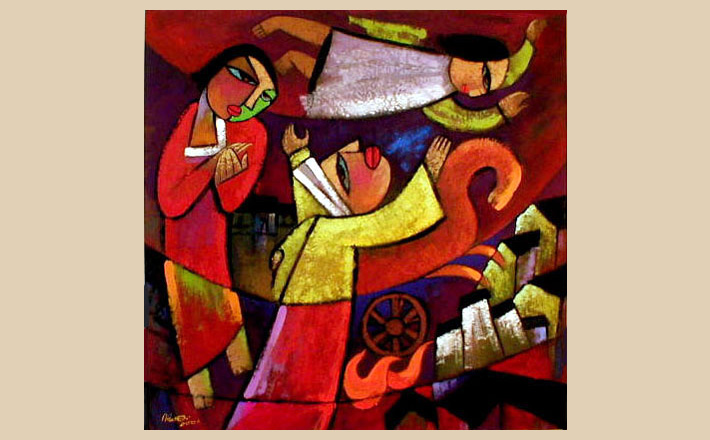Commentary on Psalm 16
In recent years, Psalms scholarship has been inclined to attend more carefully to the sequencing of the poems.
To be sure, it is not always possible to discern meaningful relationships among neighboring psalms; but the question is worth asking. In the case of Psalm 16, we can say at least that it makes really good sense following Psalm 15 (note also the linkage suggested by “never be moved” in 15:5 and “not be moved” in 16:8).
Psalm 15 is usually categorized as an entrance liturgy and, having entered the Temple (or more symbolically, having affirmed the desire and intent to live in God’s presence), the psalmist responds in Psalm 16 with a brief opening prayer (verses 1-2) followed by an extended profession of trust in God (verses 3-8). God is addressed directly again in verses 10-11, so the language of prayer (verses 1-2, 10-11) encompasses the extended profession of trust (and note too the brief direct address of God in a portion of verse 5).
Even the prayer portions have the character of an affirmation of faith, so Psalm 16 is ordinarily classified as a psalm of trust/assurance/confidence. In fact, Erhard Gerstenberger, a major form critic, labels Psalm 16 not only a “Song of Confidence,” but also a “Confession of Faith.” And Gerstenberger concludes, “The psalm can be compared in its function with the Apostles’ Creed in Christian worship.”[1]
The Apostles’ Creed, of course, is a (perhaps the) foundational Christian creed. If Psalm 16 is really comparable, as Gerstenberger suggests, it may be helpful to think about Psalm 16 as something like a poetic expression of and elaboration upon the faith affirmed in the first of the Ten Commandments — “no other gods” (Exodus 20:3) — and in the pivotally important Shema, “Hear, O Israel: The LORD is our God, the LORD alone” (Deuteronomy 6:4).
In short, Psalm 16 is a lovely and eloquent poetic rendering of Israel’s radical monotheism. Each of its sections — verses 1-2, 3-4, 5-6, 7-8, 9-11 — offers a variation on the theme of “no other gods” or “the LORD alone.”
Verse 1 features the major psalmic concept of “refuge,” which is introduced in Psalm 2:12 and appears frequently, especially in Book I (Psalms 1-41; see 5:11; 7:1; 11:1; 14:6; and more). To “take refuge” in God means to trust God unreservedly. This, in turn, means to submit the self fully to God, as the psalmist indicates that she or he has done by addressing God as “my Lord” in verse 2.
The theme of “the LORD alone” culminates in the conclusion to verse 2. The word “good” refers to the resources, material and otherwise, that make life possible; so the psalmist affirms that his or her life derives from and depends solely upon God.
Verses 3-4 are notoriously difficult, and translations vary considerably. According to the NRSV construal, the psalmist expresses exclusive loyalty to God by honoring those who honor God (verse 3), as well as by avoiding every semblance of idolatry (verse 4).
In contrast to those who drink idolatrous offerings (verse 4), the LORD is the psalmist’s only “cup” (verse 5). But the real unifying feature of verses 5-6 is the language of land-settlement that is drawn from the book of Joshua — “”portion” (Joshua 19:9), “lot” (18:6, 8), “boundary lines” (17:5, NRSV “portions”), and “heritage” (14:3; 17:6; NRSV “inheritance”). Because land represented access to life, the affirmation again is that the psalmist’s life derives from and depends solely upon God.
The affirmation “I will bless the LORD” (Psalm 16:7) reinforces the psalmist’s submission to God (see verse 2), since “bless” seems originally to have meant something like to “kneel in obeisance to.” The mention of “counsel” and round-the-clock instruction recalls Psalm 1 (see “advice” in 1:1 and “night” in 1:2), which opens the Psalter by orienting readers exclusively to God and God’s will, as a matter of life and death. Verse 8 continues the focus on the constancy of God’s presence, which proves to be the psalmist’s sole source of stability (see 15:5, and compare 13:4 where “shaken” represents the same Hebrew root).
The variation on the theme of “the LORD alone” involves anthropological language in verse 9: “heart,” “soul” (more literally “glory”), and “body.” The psalmist’s whole being is involved in the unreserved commitment to God. So the psalmist does what all Israel does in 14:7 in responses to God’s life-giving presence: “is glad” and “rejoices.” The Hebrew root underlying “secure” (verse 9) is ordinarily translated “trust,” reinforcing the opening affirmation of refuge found in God. The result is life (verse 10; “Sheol” and “the Pit” are names for the realm of the dead).
Not surprisingly, “the path of life” is mentioned explicitly in verse 11. This verse serves well as a culmination, since its vocabulary recalls earlier sections of the poem — see “pleasures” and “pleasant places” (verses 6, 11), “right hand” (verses 8, 11), and “joy”/”rejoices” (verses 9, 11). The repetition summarizes and reinforces the message of the whole; that is, the psalmist’s joyful affirmation that his or her life derives from and is dependent upon “the LORD alone.”
The appearance of Psalm 16 in the lectionary is an opportunity both to appreciate its artistic beauty and to open ourselves to the challenge of Israel’s radical monotheism. In our pervasively self-centered context, for instance, what difference might it make if we entertained the conviction that life is not something we achieve, but rather something we receive as a gift from God? What difference might it make if we viewed the life-sustaining resources that most of us enjoy not as something we have earned or deserve, but rather as evidence of God’s goodness? Might a pervasive sense of entitlement begin to be replaced by a posture of humility and gratitude?
My tradition tries to capture the challenge of Israel’s radical monotheism in the first question and answer of the Westminster Shorter Catechism (which I paraphrase as follows): “What is the chief end of humankind? The chief end of humankind is to glorify God and enjoy God forever.” A symptom of our dis-ease is the fact that enjoying God is essentially nonsensical to most of us. But the psalmist knew what it meant to enjoy God! What difference might it make if we began to try to ground our pleasure and joy not in self nor in stuff but in God? It’s worth a try!
[1] Erhard Gerstenberger, Psalms: Part I(Grand Rapids: Eerdmans, 1988), 90.


June 30, 2013